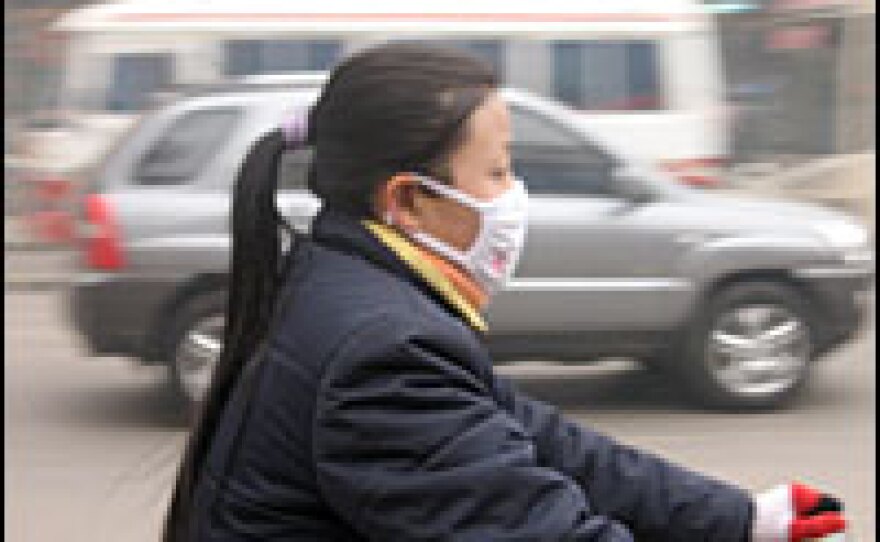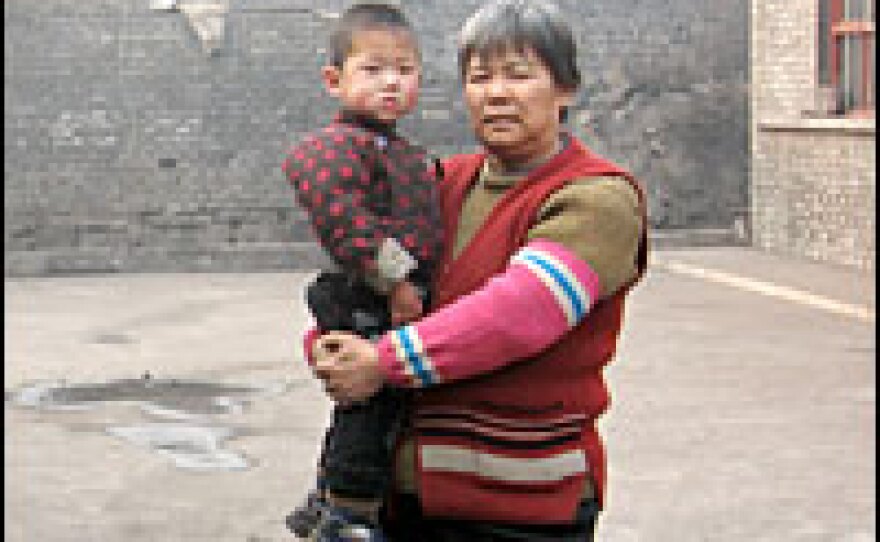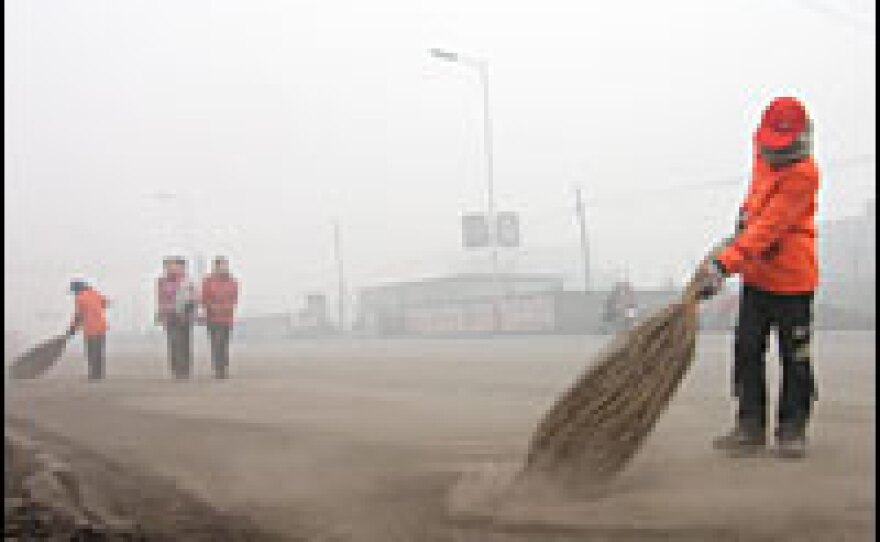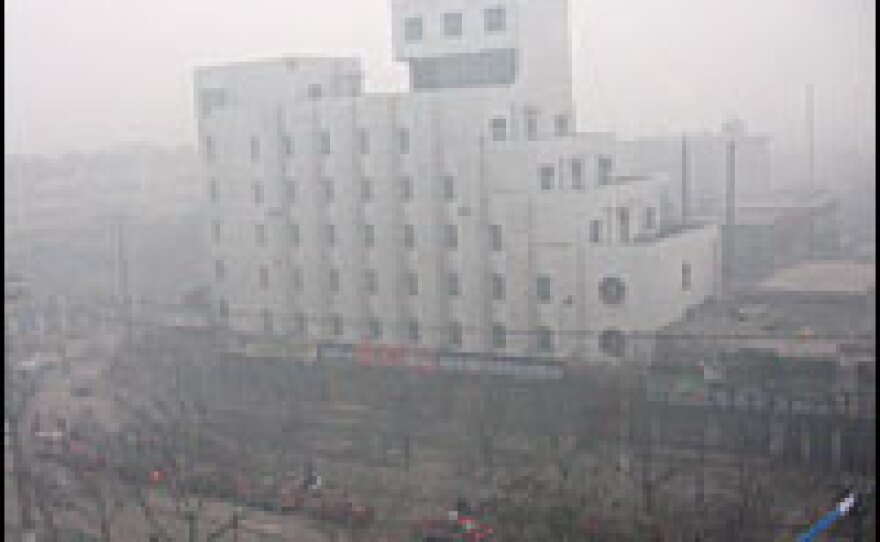


According to the World Bank, 16 of the world's 20 most polluted cities are in China. The industrial revolution transforming the world's most populous country is also destroying its environment. China is now the world's second-largest emitter of carbon dioxide, the main gas linked to global warming, and it is set to overtake the United States in 2009, a decade earlier than previously predicted.
A visit to Shanxi province's Linfen, the city that has topped China's pollution charts for the past three years, demonstrates the factors contributing to China's rise in greenhouse gases.
At 7:30 a.m. on Linfen's streets, it feels more like the middle of the night because it is still dark and drivers need their headlights on in order to navigate the haze of pollutants. People are going to work, and many are wearing face masks in a desperate attempt to protect themselves against the air they breathe.
'We've Ruined Mother Nature'
The hospital is one of the busiest places in town, and the respiratory diseases department is the busiest of all.
Every day, there are too many patients to count here, says textile worker Sun Haixia. She has accompanied her grandmother, who is suffering from a chronic cough, to the hospital. The air pollution affects everybody, she says.
"We've pushed our environment to its limits," Sun says.
One of the reasons for this environmental degradation is clear in Beilu village on the city's outskirts. Coal, which is the mainstay of the local economy, heats the brick bungalows here. The air is acrid and sulfurous, making residents' eyes sting and their throats dry and scratchy. Piles of snow on the ground are black from coal dust.
Wang Dongli, a 36-year-old villager, says that after economic reforms started in 1979, the number of factories grew and the blue sky disappeared.
"We've ruined Mother Nature," she says.
Cancer, Other Diseases Take Toll
The local doctor, Zhang Keguan, says Beilu is known locally as "the cancer village."
Of the approximately 1,000 people in the area, Zhang says at least 20 people have died from cancer recently, while three or four are still suffering from the disease. And most who died in recent years were young — just 30 or 40 years old, he says.
The anecdotal evidence of a high death rate is backed up by a government research project by a scientist who didn't want to be interviewed. Figures show the normal death rate in China is six per 1,000 each year. In the most polluted parts of Linfen, for those ages 55 and older, that rate has risen to 61 per 1,000 each year.
For Qiao Xiaoling, such bald statistics disguise the terrible pain of loss. Her husband died four years ago from leukemia. Then lung cancer claimed her 34-year-old son. As she minds her 3-year-old grandson, she admits she doesn't know what caused their illnesses.
"I don't know if it's because of the water or the air. I'm scared in my heart and worry about this little boy. I think about moving, but I don't have the money," Qiao says.
Economic Development vs. Environmental Degradation
Trucks transporting coal thunder past her house 24 hours a day. About a half-mile from Beilu village, there's a coke oven, a coal-processing plant, a power station and a pharmaceutical factory. The village is located in a natural basin that traps pollutants. And the shallow village wells are polluted, too.
But officials like Wang Jinglong from the Shanxi Environmental Protection Agency admit that polluting factories play a vital role in China's development.
"If we closed all Linfen's polluting factories, the environment would clear up. The water would still be polluted, but the air would be better. But then a new problem would emerge — how would people afford to eat?" Wang says.
He says the government has closed 40 coke ovens in Linfen in the past year alone and is determined to do more. But on the ground, there is still a real feeling of discontent.
Pollution Outsourcing Plagues China
The people in Linfen feel abandoned and bitter: They think cleaning up environmental pollution should be a priority, a view shared by 93 percent of the residents of Shanxi province, according to a recent government survey. But 91 percent of city mayors in the province fear environmental measures would harm economic progress. It is a sign of a gulf dividing China's citizens from those who govern them.
Some, however, argue that the problem isn't just China's, but a consequence of globalization and the outsourcing of pollution. The United States, for example, has shut down many of its coke plants and transferred that production to developing countries, such as China.
Figures from researchers at MIT show that in 1970, China produced less than 10 percent of the world's coke. Now, that figure has risen to about 50 percent, while American and European coke production has declined.
Gap Widens Between Haves and Have-Nots
In China, these polluting industries are making some people rich. That much is clear in a grimy car showroom on the outskirts of Linfen. Manager Wang Hongsheng says sales are growing here at some of the fastest rates in China — about 20 percent a year.
More cars will emit more pollutants. And as the average standard of living rises, China's thirst for energy grows. So it's opening a new coal-fired power plant a week, leading again to more polluting emissions.
One scene outside Linfen encapsulates the challenges China faces. A team of orange-coated street sweepers are hard at work, armed with brooms made from tree branches. They sweep energetically, corralling the coal dust into black heaps by the side of the road. But even as they work, factories around them belch out pollution and more coal trucks hurtle past, leaving more coal dust in their wake. It's a scene that illustrates the magnitude of the task ahead.
Copyright 2022 NPR. To see more, visit https://www.npr.org. 9(MDAzMjM2NDYzMDEyMzc1Njk5NjAxNzY3OQ001))







